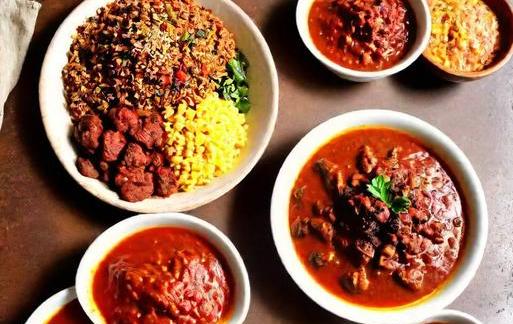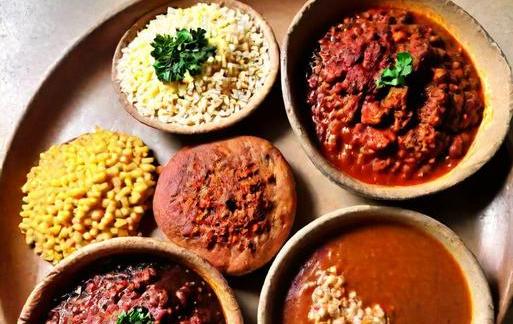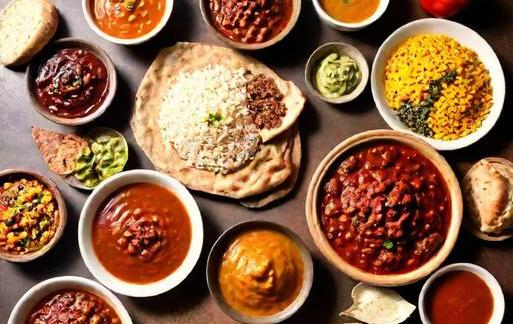- You are here:
- Home »
- Food
- » [REVEALED] African Foods That Start With U
[REVEALED] African Foods That Start With U
Note: This page contains affiliate links.
As an Amazon Associate, I earn from qualifying purchases when you click on the link, but you are not charged extra.
Africa, with its rich cultural diversity and vibrant culinary traditions, offers a treasure trove of unique and delicious foods. In this gastronomic exploration, we delve into the world of African cuisine, focusing specifically on foods that start with the letter "U." From traditional staples to exotic delicacies, the African continent showcases a remarkable array of flavors and textures. Join us on this culinary journey as we uncover the diverse and mouthwatering foods that represent the letter "U" in African cuisine.
Contents
List Of African Foods That Start With U

1. Ugali
Ugali, often referred to as the "staple food" of many East African countries, holds a prominent place in the hearts and on the plates of millions. This simple yet satisfying dish consists of maize flour and water, cooked to a dense, dough-like consistency. It is typically served as an accompaniment to various stews, sauces, and meats. The versatility of ugali makes it a culinary cornerstone, reflecting the resourcefulness and adaptability of African cooking.
2. Uji
Uji, a warm and nourishing porridge, is a breakfast favorite across the African continent. Made from a variety of grains such as millet, sorghum, or maize, uji is known for its energy-boosting properties and its ability to kickstart the day. It is often sweetened with sugar or honey and may be enriched with spices, providing a comforting and nutritious start to the morning.
3. Usi
In Tanzania, usi takes center stage as a vital part of the local diet. This fermented porridge is crafted from finely ground maize or millet and water. The fermentation process adds depth to the flavor, and usi is commonly consumed alongside vegetables, beans, or meat dishes. Its distinctive taste and texture make it a beloved dish, showcasing the creative use of indigenous ingredients in African culinary traditions.
4. Ugba
Ugba, also known as oil bean, is a delicacy found in Nigerian cuisine. Derived from the seeds of the oil bean tree, this dish is prepared by fermenting the seeds and then seasoning them with spices, oil, and sometimes vegetables. The result is a savory, piquant dish often enjoyed as a side dish or appetizer. Ugba highlights the diversity of flavors and culinary techniques present in Nigerian gastronomy.
5. Umngqusho
Originating from the Xhosa and Zulu communities in South Africa, umngqusho is a hearty and wholesome dish. It features a combination of sugar beans and maize, slow-cooked until tender. The dish is often flavored with onions, potatoes, and various spices, creating a savory and satisfying meal. Umngqusho’s cultural significance and delicious taste make it a symbol of traditional South African cuisine.
6. Ukodo
Ukodo, a popular soup in Nigeria, stands out for its unique combination of ingredients. Prepared with yams, plantains, and assorted meats, including goat meat and tripe, this spicy and flavorful soup is a celebration of robust flavors. The use of local spices and aromatic herbs elevates ukodo to a culinary masterpiece, showcasing the depth and complexity of Nigerian gastronomy.
7. Uji Na Uji
In Kenya, uji na uji is a dish that holds both cultural and nutritional significance. This double-layered porridge is crafted by blending sorghum and millet flours, creating a wholesome and textured base. The dish is then topped with a rich, creamy mixture made from groundnuts and coconut milk. Uji na uji embodies the essence of Kenyan cuisine, combining diverse ingredients to create a harmonious and nourishing meal.
8. Ulli Or Uziza Soup
Hailing from the Igbo people of Nigeria, ulli or uziza soup is a spicy and aromatic delight. The key ingredients include utazi leaves, uda spice, and uziza seeds, which contribute to the soup’s distinctive flavor profile. Typically prepared with a variety of meats and fish, ulli or uziza soup showcases the artistry of blending bold spices and herbs in Nigerian cooking.
9. Usunu
Usunu, a lesser-known gem in African cuisine, is a traditional dish from the Hausa people of Nigeria. It consists of fermented locust beans, which are mashed into a paste and then cooked with spices and oil. The result is a savory and aromatic condiment that adds depth to a variety of dishes. Usunu reflects the ingenuity of African culinary practices, utilizing locally available ingredients to create unique and flavorful accompaniments.
10. Ufuta Sauce
From the heart of East Africa comes ufuta sauce, a sesame-based condiment that adds richness and depth to various dishes. Toasted sesame seeds are ground into a paste and combined with oil and spices, creating a versatile sauce. Ufuta sauce is commonly used as a dipping sauce or drizzled over vegetables and meats, showcasing the importance of sesame in East African cuisine.
The culinary landscape of Africa is a vibrant tapestry woven with a myriad of flavors, textures, and traditions. The diverse array of foods that start with the letter "U" reflects the ingenuity, resourcefulness, and cultural richness present in African cuisine. From staple foods like ugali and uji to exotic delicacies like ugba and uziza soup, each dish tells a unique story of heritage and culinary artistry. As we celebrate the foods that start with "U" in African gastronomy, it is essential to recognize the role of local ingredients, traditional cooking methods, and the cultural significance embedded in each dish. The culinary journey through African foods that start with "U" is not just a gastronomic exploration but a testament to the resilience and creativity of the diverse communities that contribute to the rich tapestry of African cuisine.
Significance

African cuisine is a rich tapestry woven with diverse flavors, textures, and cultural influences. As we delve into the culinary landscape of the continent, our focus narrows down to a specific and intriguing category – foods that start with the letter "U." In this exploration, we will traverse through various regions, uncovering unique delicacies that contribute to the vibrant mosaic of African gastronomy.
The significance of exploring African foods starting with "U" lies not only in discovering lesser-known dishes but also in celebrating the cultural diversity that characterizes the continent. Food is an integral part of any culture, reflecting history, geography, and traditions. By delving into these lesser-explored culinary gems, we gain a deeper understanding of the people, their heritage, and the culinary techniques that have been passed down through generations.
Category-Related

1. Ugali
Description: Ugali is a staple food in many African countries, known by various names such as sadza, pap, or nsima, depending on the region. It is a simple yet hearty dish made from maize flour and water, cooked to a thick porridge-like consistency.
Preparation: The preparation involves stirring maize flour into boiling water until it reaches a dense, dough-like texture. It is often served as an accompaniment to stews, curries, or sautéed vegetables.
Cultural Context: Ugali holds immense cultural significance, symbolizing sustenance and community. It is often eaten communally, with people sharing from a central dish.
2. Ugba
Description: Also known as "ukpaka," Ugba is a traditional Igbo dish made from oil bean seeds. These seeds are sliced thinly, fermented, and then used as a key ingredient in various dishes.
Preparation: The preparation involves slicing and fermenting oil bean seeds, resulting in a unique flavor profile. It is often used in salads, soups, or eaten as a snack.
Cultural Context: Ugba showcases the culinary ingenuity of the Igbo people, highlighting their use of fermentation to enhance both flavor and nutritional value.
Common Themes
1. Utilization Of Indigenous Ingredients
A common theme among African foods starting with "U" is the reliance on indigenous ingredients. Whether it’s the maize used in Ugali or the oil bean seeds in Ugba, these dishes celebrate the rich agricultural biodiversity of the continent. The use of locally sourced ingredients not only adds distinct flavors but also contributes to the sustainability and authenticity of the cuisine.
2. Versatility In Serving Styles
Another common theme is the versatility in serving styles. Ugali, for example, can be served as a side dish with various main courses. Similarly, Ugba finds its way into salads, soups, and snacks, showcasing the adaptability of these dishes in complementing different culinary contexts.
Interesting Facts
1. Ugali And Its Variations
While Ugali is a common name for this staple dish, its variations are vast. In Kenya, it is known as "ugali," in Zimbabwe as "sadza," and in Malawi as "nsima." The diversity in names is a testament to both the ubiquity and regional nuances in the preparation and consumption of this essential African food.
2. Ugba As A Nutrient-Rich Snack
Ugba, despite being a snack or an ingredient in various dishes, is nutrient-dense. The oil bean seeds used in Ugba are rich in protein, healthy fats, and vitamins. This makes it not only a flavorful addition to meals but also a nutritious snack that aligns with modern health-conscious lifestyles.
Conclusion
Exploring African foods that start with "U" offers a fascinating journey into the heart of the continent’s culinary traditions. From the staple simplicity of Ugali to the nuanced flavors of Ugba, each dish tells a story of history, culture, and community. The significance of these foods goes beyond mere sustenance; they are threads that weave the fabric of African identity. As we savor the diverse tastes and textures, we not only indulge our palates but also gain a profound appreciation for the rich tapestry of African gastronomy.


